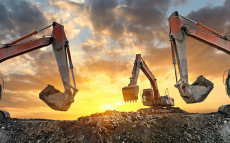- pathfindersAI
- Job Profile
Continuous Mining Machine Operators
Summary
Continuous Mining Machine Operators: Navigating the Depths of Resources Extraction
What They Do
Continuous Mining Machine Operators play a crucial role in the extraction of valuable minerals and resources from the Earth's crust. These professionals operate self-propelled mining machines that rip coal, metal, and other materials from mine walls and floors. Utilizing advanced machinery, they ensure that the materials are efficiently and safely extracted for further processing and use in various industries. Their proficiency in handling sophisticated equipment significantly contributes to the productivity of mining operations and the overall economic development of communities that rely on mining activities.
Job Responsibilities
The responsibilities of Continuous Mining Machine Operators encompass a range of tasks critical to the mining process. They include setting up and operating continuous mining equipment and ensuring its efficient performance. Operators must monitor and control the cutting or extracting process and adjust the machinery to control the flow of materials. Regular maintenance and troubleshooting of the equipment are essential to prevent machinery breakdowns and production delays. Additionally, these professionals need to maintain accurate records of their operations and communicate effectively with other team members to coordinate activities. Ensuring adherence to safety protocols and environmental regulations is another significant aspect of their job, as it helps protect the workers and minimize ecological impacts.
Essential Skills
To excel as a Continuous Mining Machine Operator, an individual must possess a combination of technical and soft skills. Technical proficiency in operating and maintaining complex machinery is paramount. This includes a solid understanding of mechanical systems and the ability to perform routine maintenance. Strong problem-solving skills are essential for diagnosing and addressing equipment malfunctions efficiently. Operators must also have good hand-eye coordination and physical stamina, as the job can be demanding and requires long hours of operation. Effective communication skills are crucial for coordinating with team members and ensuring smooth operations. Additionally, a keen awareness of safety protocols and the ability to work in hazardous environments are vital for minimizing risks and ensuring a safe working environment for all.
Educational Pathways
Aspiring Continuous Mining Machine Operators typically follow specific educational pathways that prepare them for this challenging but rewarding career. A high school diploma or equivalent is often the minimum educational requirement. High school courses in mathematics, mechanical drawing, and physical sciences can provide a useful foundation. Post-secondary training programs, such as vocational or technical schools, offer more specialized training in mining technology, mechanical systems, and equipment operation. These programs often include hands-on training with professional-grade machinery. Some operators also benefit from on-the-job training and apprenticeships, where they gain practical experience under the guidance of experienced professionals. Continuous learning and certification programs are also available to help operators stay updated with the latest technologies and safety standards.
Career Prospects
The career prospects for Continuous Mining Machine Operators are closely tied to the demand for natural resources. The mining industry is cyclical and can be affected by fluctuations in commodity prices, technological advancements, and environmental regulations. However, mining remains a significant industry worldwide, providing steady employment opportunities for skilled operators. With experience and additional training, operators can advance to supervisory or managerial roles within mining companies. Some may also choose to specialize in specific types of mining equipment or move into related fields such as maintenance or logistics. Overall, the demand for skilled operators remains strong, especially in regions rich in natural resources and areas investing in sustainable mining practices.
Conclusion
Continuous Mining Machine Operators are indispensable to the resource extraction industry, ensuring the efficient and safe procurement of vital materials. Their roles encompass a blend of technical expertise, physical endurance, and a strong commitment to safety. With the right educational background and training, individuals can embark on a fulfilling career in this field, benefiting from solid job prospects and opportunities for advancement. As the mining industry continues to evolve, these operators will remain at the forefront, driving progress and innovation in the sector.
Video
Compensation
| State | Median Salary | Median Hourly | Positions |
|---|---|---|---|
| AL | 57,040 | 27.42 | 290 |
| AZ | 53,220 | 25.59 | 2,190 |
| AR | 37,140 | 17.86 | 130 |
| CA | 60,910 | 29.29 | 1,010 |
| CO | 76,890 | 36.96 | 370 |
| FL | 45,010 | 21.64 | 140 |
| GA | 46,410 | 22.31 | 50 |
| ID | 65,530 | 31.50 | 120 |
| IL | 73,300 | 35.24 | 220 |
| IN | 57,610 | 27.70 | 430 |
| KY | 52,500 | 25.24 | 620 |
| LA | 35,700 | 17.16 | 130 |
| MD | 60,500 | 29.09 | 40 |
| MI | 52,080 | 25.04 | 300 |
| MS | 39,820 | 19.14 | 70 |
| MO | 43,370 | 20.85 | 1,090 |
| NE | 49,430 | 23.77 | 110 |
| NV | 80,480 | 38.69 | 1,860 |
| NY | 63,220 | 30.39 | 110 |
| NC | 63,010 | 30.29 | 60 |
| OH | 51,200 | 24.61 | 100 |
| OK | 40,010 | 19.23 | 220 |
| PA | 57,420 | 27.61 | 500 |
| SD | 107,100 | 51.49 | 90 |
| TN | 49,450 | 23.77 | 410 |
| TX | 40,600 | 19.52 | 620 |
| UT | 64,980 | 31.24 | 1,200 |
| VA | 61,860 | 29.74 | 350 |
| WV | 72,430 | 34.82 | 1,170 |
| WI | 61,630 | 29.63 | 70 |
| WY | 88,820 | 42.70 | 290 |
Similar Occupations
In this area you will find other occupations that are close to the one you were viewing in tasks, knowledge and work environment. If the primary job profile you are viewing isn't quite to your liking, take a look around and see what else is available.
Basic and Premium Accounts have more alternative occupations available than the Free account.

Crane and Tower Operators - 53-7021.00
Crane and Tower Operators are responsible for controlling and maneuvering cranes and tower equipment to lift, move, and position heavy materials and objects at construction sites, docks, and industrial facilities. They ensure safety protocols are followed while coordinating with ground crews to execute precision tasks efficiently and accurately.
-
$64,690/yr
Median Pay -
42,260
Number of Jobs

Earth Drillers, Except Oil and Gas - 47-5023.00
Earth Drillers, Except Oil and Gas, operate various drilling equipment to tap into soil, rock, and underground water sources for purposes such as construction, environmental testing, and mineral exploration. Their duties include monitoring equipment performance, maintaining safety standards, and ensuring the accuracy of drill depths and angles.
-
$56,660/yr
Median Pay -
18,010
Number of Jobs